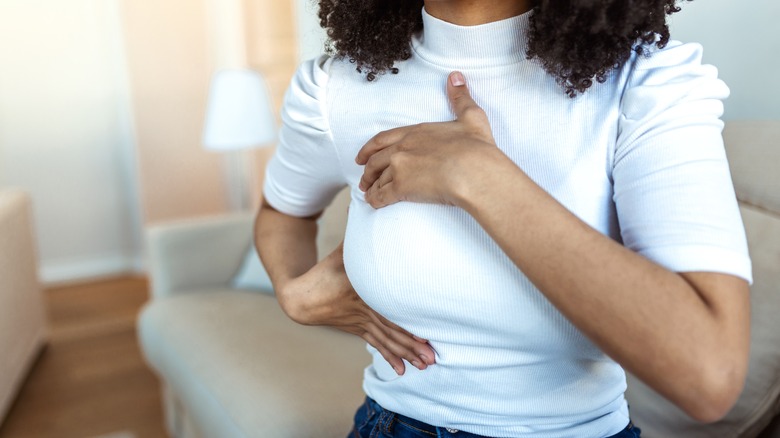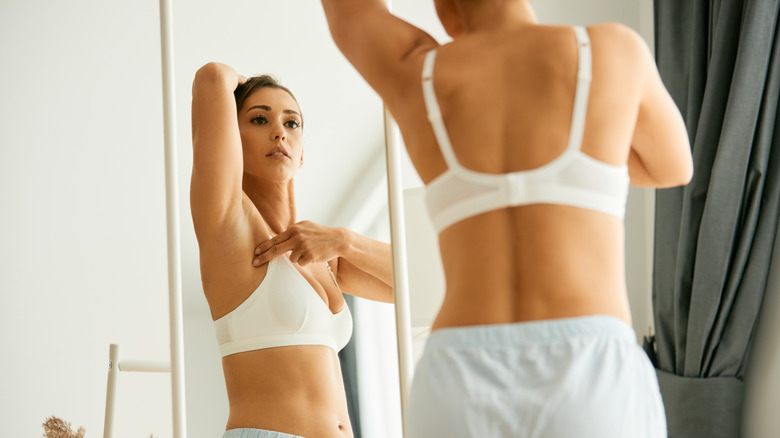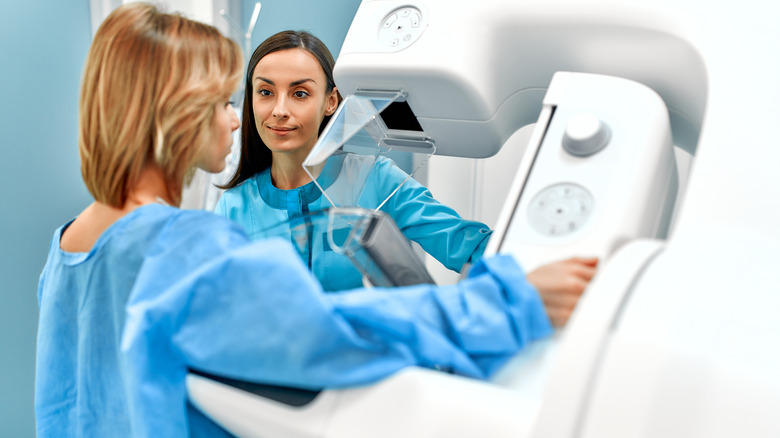The Potential Mental Health Harms Of Breast Self-Exams Might Outweigh The Benefits
According to the Centers for Disease Control and Prevention, around 264,000 women and 2,400 men get diagnosed with breast cancer every year. And while fatalities for this particular type of cancer have gradually decreased, it remains the second leading cause of cancer death in women. Doctors have always urged their patients to get regular breast cancer screenings, and at one point, self-examination was also strongly recommended to keep on top of any changes.
Some experts continue to encourage people to check their breasts for abnormalities as a form of precaution. ”I tell everybody to do it,” Dr. Hiram S. Cody 3d, a breast surgeon, admitted to The New York Times. He warned, ”If we tell women it's not important to examine themselves, we might be making a big mistake.” Another oncologist also told the publication that even though there's a lack of evidence pointing to the efficacy of breast self-examination, it's still important.
Health professionals instruct people to stand in front of a mirror, lift their arms above their head, and then thoroughly check their breasts and armpits for lumps, discoloration, and any other notable changes. While there's no harm in doing this every once in a while, it turns out that the American Cancer Society (ACS) no longer advises the public to do such an examination as it has adverse ramifications on one's mental health.
Self-exams aren't the be-all and end-all
There's nothing inherently wrong with breast self-examination, but the ACS wants to underscore its limitations. Dr. Deborah Lindner, the chief medical officer for the non-profit organization Bright Pink, pointed out to Well + Good that the procedure "has never been shown to decrease the mortality of breast cancer." She elaborated: "[This means] people die of breast cancer at the same rate whether they do breast self-exams and mammograms, or just skip the self-exam and do mammograms as recommended."
Additionally, breast self-exams may only result in mental and emotional distress for people who do them too often. "Doing a monthly breast self-exam while thinking it is your responsibility to catch your own cancer [can] lead to increased anxiety, depression, and fear," Dr. Lindner noted. Meanwhile, breast surgeon Dr. Susan Love argued to The Atlantic that self-examination "is not any better than noticing or rolling over in bed or having your lover find the lump."
As it turns out, most people who have discovered that they have breast tumors have actually found them in the midst of their daily routine, for instance, while dressing or sleeping. On the flip side, Dr. Angela Jain, assistant professor in the Department of Hematology and Oncology at Fox Chase Cancer Center, advises people to still continue performing self-exams every once in a while because you can never be too sure, as she told The Philadelphia Inquirer.
Inside breast cancer prevention as a whole
In 2015, ACS had already removed self-exams as part of their recommended procedures for early detection of breast cancer. Instead, they began encouraging everyone to get regular mammograms, including younger, ostensibly healthier women. Dr. Elizabeth Comen, a medical oncologist at Memorial Sloan Kettering Cancer Center, also highlighted the importance of consulting with health professionals.
"The best prevention is screening, since they may not have any symptoms," she explained to Allure, adding that if anything is found either through a mammogram, ultrasound, or MRI, a biopsy will be conducted to determine whether the growth is benign or malignant. Ultimately, though, the most important thing is to be more familiar with your breasts and genetic history, so you'll know whether it's time to take a trip to the hospital.
"The new recommendation is to practice breast self-awareness," Dr. Lindner confirmed simply, "which means knowing what your normal breasts look and feel like, knowing your family history and personal risk of breast cancer," and finally understanding when to worry — because something significant has changed and requires a mammogram or further examination. Prevention is still very important, but there are lots of different elements to it beyond just self-examination.


